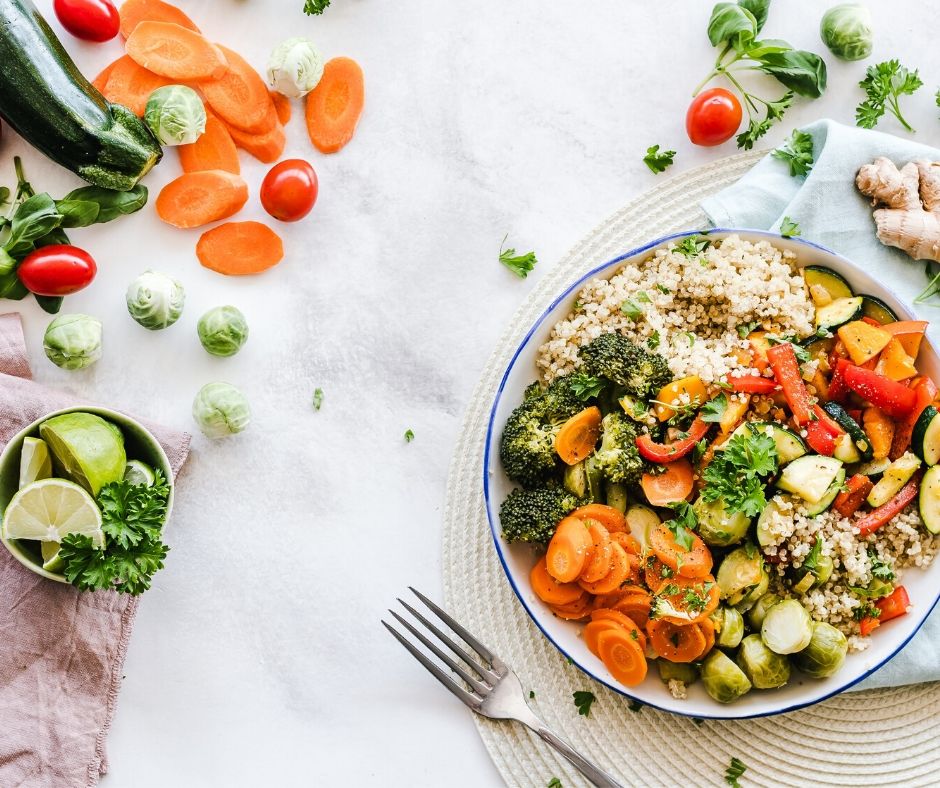
Plant Based Eating is so hot right now! Have you noticed the array of new vegan foods in the supermarket? Veganuary is certainly in full swing.
In the UK, only 30% of us manage to get our 5 a day* so eating more plant foods is a step in the right direction. Ingredients like vegetables, nuts, seeds, whole grains and beans bring lots of health-promoting fibre vitamins, minerals and polyphenols onto your plate too.
In fact, the simple action of eating more plants can come with some fantastic health gains like making you less likely to become overweight or obese and having a lower risk of heart disease, stroke and some cancers**. Amazing!
What’s Not To Love?
It is just as easy to be an unhealthy vegan as an unhealthy meat eater! If you haven’t planned how to get key nutrients like plant-based protein, fats and micronutrients, you may be at risk of deficiencies like low calcium associated with osteoporosis or low iodine associated with disrupted thyroid function.
Bottom line – you can’t just remove all animal products and replace them with vegetables.
Are you keen to try a plant-based diet? Already trying Veganuary this year? Here are my top tips to help you supercharge your plant plate:
Tip 1: Plant Based Proteins
Proteins are the building blocks of life. Proteins from plants come from sources such as beans, pulses, tofu, buckwheat, quinoa, nuts and seeds. Tofu, buckwheat and quinoa are ‘complete’ proteins which means they have all the amino acids your body needs to form proteins.
Other plant foods like beans and legumes have some amino acids in them, but not all.
By eating a few different types of these foods each day your body can take amino acids from different foods and combine them to build proteins.
Tip 2: Watch Out For B12
When you cut out meat and dairy you also cut out major sources of B12. Not getting enough B12 can lead to fatigue, anaemia and nerve damage among other things.
To make sure you still get B12 in your plant based diet. Look for fortified foods like nutritional yeast and cereals with added B12. Consider taking a daily supplement.
If you suspect you might be B12 deficient, you can ask your GP to check via a simple blood test (or ask a RNutr to arrange this for you).
Tip 3: Buy Fortified Dairy Free Milks And Yoghurts
If you are going dairy free, think about how you are going to replace essential micronutrients like calcium and iodine found in animal milks.
Some supermarket plant drinks and yogurts like Oatly and Alpro are fortified by adding vitamins and minerals back in. Check your labels and make sure you are drinking fortified options give your body what it needs.
Tip 4: Load Up On Green Leafy Veg
Vegetables like pak choi, spinach kale and parsley are great for bringing calcium and iron onto your plate as well as Vitamin C (which helps with the absorption of these minerals).
You could try experimenting by making your own pesto with kale or spinach or adding lashings of coriander to your rice dishes. These herbs are packed with flavour as well as goodness!
Tip 5: Don’t Be Afraid To Change Your Mind
If you’ve tried the switch to plant based eating and it doesn’t work for you don’t be afraid to change your mind. It doesn’t have to be all or nothing.
How about having two out of three plant based meals a day? Committing to meat free Mondays? Becoming vegetarian rather than vegan?
You can still be a plant based eater whilst having flexibility in your diet!
Bio
Ali is a Registered Nutritionist (RNutr) meaning she meets the highest standards in nutrition science training, competence and professional practice set out by the UK Voluntary Register of Nutritionists (UKVRN).
She is also a Certified Nutrition Coach and has a Masters in Public Health (Health Promotion). For 15 years Ali has worked with global food manufacturers including Nestle and Unilever, the UN and international charities developing their nutrition policies and behaviour change programmes.
As well as her public health delivery, Ali supports private clients on a one to one basis and delivers corporate wellness packages to businesses across the UK.
For more top tips on a healthy plant based diet follow my Insta @alimorpeth_nutrition
*Health Survey **Nutrition Society








